7 Seats, Best-In-Class Fuel Economy
Do you need to haul up to seven people and their gear, maybe even to the slopes where traction is a concern? How about all that, plus getting the best fuel economy for any midsize Sport Utility Vehicle (SUV). If this describes your life—and you know who you are—then continue reading as the 2014 Toyota Highlander Hybrid Limited AWD just may fit your needs.
Drivetrain
The All-Wheel Drive (AWD) Toyota Highlander Hybrid is powered by Toyota’s Hybrid Synergy Drive system of a 3.5L, 24-valve, double overhead cam (DOHC) gasoline-powered, V6 engine and a front 123-kW and rear 50-kW electric motor, producing a total of 280 hp running through a Continuously Variable Automatic Transmission (CVT). The AWD system electronically adjusts from the normal front wheel drive mode to all-wheel drive, where the rear wheels are activated, when there is heavy acceleration or tire slippage is detected, as in driving on ice and snow.
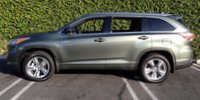
Fuel economy for the Highlander Hybrid is rated at 27 city/28 highway with a combined of 28 mpg, just shy of our AWD 30 MPG Club. Running on regular unleaded, I drove 335 mostly highway miles and averaged 26 mpg. Which means I had about another 100 miles in the 17.1-gallon tank before empty.
To maximize fuel economy, Toyota’s Hybrid Synergy Drive automatically switches between the electric drive mode, combined electric and gasoline engine, and gasoline-only engine power. The transitions are seamless and smooth, and can be monitored by viewing the dash gauges.
When driving a hybrid I like the option to select EV, especially around town, forcing the car to run solely on electric power. The Highlander Hybrid did not have this option and I never quite mastered feathering the accelerator pedal to keep the gasoline engine from kicking in. Being able to hold the car in electric mode is a big fuel saving advantage and would be a nice feature to add. (It does show up on Toyota’s Plug-In Prius Hybrid, which features a larger battery—ed.)
The Highlander Hybrid has three drive settings; D, EV and ECO, with the latter two indicated by a lighted EV and ECO on the instrument cluster. D is the default setting with ECO used for optimal fuel economy when cruising on the highway. EV is where you will be (if it does not kick into D) for around town driving under 25 mph. You can also use the S setting on the floor-mounted gear shifter for up-to 6 levels of engine braking, which can increase the amount of regenerated electricity being returned to the battery.
The nickel-metal hydride (NiMH) battery is charged by the engine and through the regenerative charging system, which converts kinetic energy into electric energy and stores it in the battery when applying the brakes or coasting. This process is also viewed on a dash gauge where you can watch the power flow into and out of the battery and engine.
Driving Experience: On the Road
The 2014 Toyota Highlander Hybrid can tow 3,500 lbs and weighs in at 4,861 lbs. That heft is handled by rack and pinion electronic power assist steering with a front MacPherson strut with coil springs, and a double wishbone rear suspension. On the highway the Highlander Hybrid was easy to drive but at times it would begin to float when the road undulations and rhythm were just right. A brief lift of the accelerator remedied this sensation and all was good. The steering feel was light and could be stiffer, which would not compromise any of the ride attributes.
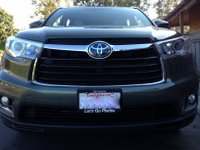
The Highlander Hybrid Limited AWD comes with 19-inch alloy wheels and is not designed to be a sports SUV, like the VW, Audi or Porsche. Hard or spirited cornering revealed significant understeer and body lean, which really isn’t unexpected from a vehicle that is meant for family transportation.
Stopping comes from Toyota’s Electronically Controlled Brake System (ECB) that incorporates regenerative control and power-assisted, four-wheel disc brakes with ABS and Electronic Brake-force Distribution (EBD). The stops were straight and consistent, but for the first time in any Toyota hybrid I have reviewed (That would include the Prius C & V, Prius, Prius Plug-in, Camry and Avalon), the brakes were touchy and grabby and I could feel the regenerative system strongly. It took some experimentation to get used to the over-sensitive brakes. When coming to a stop the combination of the regenerative braking and the hybrid motor made a noticeable, but not unpleasant, whine.
Driving Experience: Exterior
The Highlander Hybrid was redesigned for 2014 resulting in a less boxy look with softer lines and edges, which is consistent with Toyota’s current design theme. It is three inches longer than the previous model and the roofline has been lowered for a more aerodynamic look and feel. As is pretty common and the current trend in SUV design from all brands, the Highlander Hybrid has a large, aggressive grill that is the predominant feature on the front end. The wrap-around headlight design has a nice look, housing the projector-beam LED headlights. Toyota has thankfully stayed away from an overabundance of chrome bits and pieces.
Driving Experience: Interior
Clean Fleet Report was driving the entry level of the two Hybrid models, the Limited, which was nicely equipped with a power tilt and sliding moonroof, adjustable power liftgate with a very handy flip-up rear window, power windows, door locks and mirrors, 12V power outlets, folding heated power side mirrors, cruise control and multiple cup holders.
The Highlander Hybrid has seating for seven. (The non-hybrid models can seat eight.) The power 8-way adjustable, with memory and lumbar, driver seat was heated and ventilated. The front heated and ventilated passenger seat is 4-way adjustable. The second row is Captain’s Chairs (no second row bench seat is available in the hybrid) and the third row is a 60/40 folding and reclining bench seat. The second row passengers also had integrated side window shades, climate controls and folding armrests with cup holders.
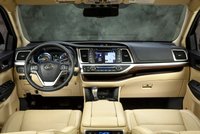
The rear seat passengers on our Highlander Hybrid were entertained by the optional BluRay DVD Entertainment System with a 9-inch display, RCA jacks, remote control and wireless headphones. Probably the only issue will be the single screen being shared by rear seat passengers. To address this there were 120V, AC power and USB outlets in the rear seating area for portable players.
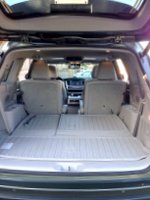
The Highlander Hybrid Infotainment (entertainment and information) comes through Toyota’s Entune system with its App Suite, which includes voice command navigation through an 8-inch high-resolution touch-screen. Excellent sound comes from the Premium JBL audio system with 12 speakers to deliver SiriusXM/FM/CD/HDAM with MP3 playback capability. The AM/FM is a cache radio, which is a nice feature and SiriusXM service is included for 90 days. There is an auxiliary audio jack, USB port with iPod connectivity, music streaming via Bluetooth wireless technology and hands-free phone capability. The auto-dimming rearview mirror was Homelink equipped and the voice activation for the telephone and navigation worked well.
The cockpit design is driver friendly except for one big concern. When I was comfortably sitting in the driver seat I was unable, at 5’ 9”, to reach the channel knob on the far right side of the radio. I had to lean forward and to the right. I had a 6’ 1” friend try it with the same result. This obviously is a design issue that Toyota should remedy. Otherwise, the gauges, including the hybrid management system, are in easy sight and with controls in easy reach including those for the tri-zone automatic temperature system. The leather-wrapped steering wheel contains audio telephone and voice controls. The roll-top center console has a lower area that is huge and can swallow-up pretty much anything you want to store away to be out of sight for security reasons.
Safety
The Highlander Hybrid is well equipped with active and passive safety features including 10 air bags, TPMS (Tire Pressure Monitoring System), hill start control, collapsible steering column, anti-theft alarm and engine immobilizer, rear view camera, blind spot monitor with rear cross traffic alert and the previously mentioned four-wheel disc brakes with ABS.
Pricing
The 2014 Toyoya Highlander Hybrid comes in two models, but can be ordered with option packages that will affect your final price. The base MSRP for the two hybrid models that only come in AWD, excluding the $860 Delivery and Handling Fee:
| LTD | $47,300 | |
| LTD Platinum | $49,790 |
The Highlander Hybrid Limited Clean Fleet Report was driving had the optional rear-seat Entertainment Package ($1,810), Driver Technology Package ($1,400) and carpeted floor mats with cargo liner ($230), bringing the total MSRP, with the $860 Inland Freight and Handling Fee, to $51,600.
The 2014 Toyota Highlander Hybrid comes with these warranties:
• 5 year/60,000 mile Powertrain
• 3 year/36,000 mile Comprehensive
• 5 year/Unlimited miles Corrosion Perforation
• 5 year/60,000 mile Roadside Assistance
• 8 year/100,000 mile Hybrid-related Component Coverage
Observations: 2014 Toyota Highlander Hybrid Limited AWD
The Highlander Hybrid was completely redesigned for 2014. Toyota did a good job in softening the edges and making the Highlander more contemporary and in line with the fierce competition in the midsize SUV market. The interior is very comfortable, especially for long trips and outings. The carrying capacity makes hauling luggage easy on those long trips.
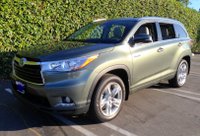
The hybrid power provides the best non-diesel fuel economy in the class and is greatly appreciated for a vehicle of this size and weight that can carry seven passengers in comfort.
If your family has grown to the point where a vehicle of this size and cost fits your needs, then by all means visit your Toyota dealership and have them walk you through all the features, technology and options and explain the hybrid technology in detail.
Whatever you end up buying, Happy Driving!

0 thoughts on “Road Test: 2014 Toyota Highlander Hybrid Limited AWD”